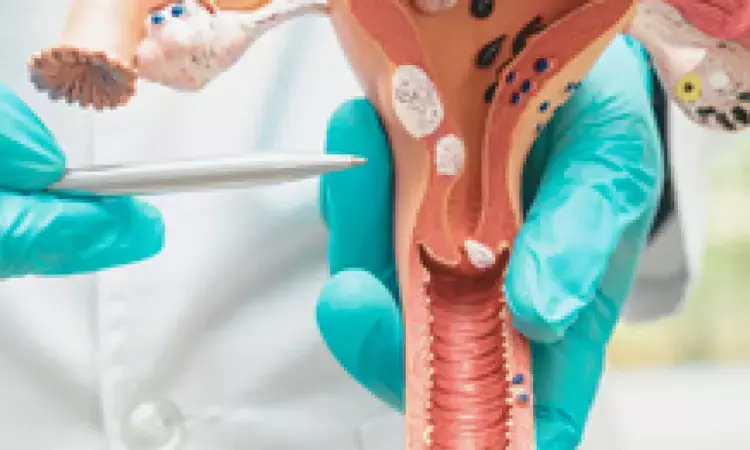- Home
- Medical news & Guidelines
- Anesthesiology
- Cardiology and CTVS
- Critical Care
- Dentistry
- Dermatology
- Diabetes and Endocrinology
- ENT
- Gastroenterology
- Medicine
- Nephrology
- Neurology
- Obstretics-Gynaecology
- Oncology
- Ophthalmology
- Orthopaedics
- Pediatrics-Neonatology
- Psychiatry
- Pulmonology
- Radiology
- Surgery
- Urology
- Laboratory Medicine
- Diet
- Nursing
- Paramedical
- Physiotherapy
- Health news
- Fact Check
- Bone Health Fact Check
- Brain Health Fact Check
- Cancer Related Fact Check
- Child Care Fact Check
- Dental and oral health fact check
- Diabetes and metabolic health fact check
- Diet and Nutrition Fact Check
- Eye and ENT Care Fact Check
- Fitness fact check
- Gut health fact check
- Heart health fact check
- Kidney health fact check
- Medical education fact check
- Men's health fact check
- Respiratory fact check
- Skin and hair care fact check
- Vaccine and Immunization fact check
- Women's health fact check
- AYUSH
- State News
- Andaman and Nicobar Islands
- Andhra Pradesh
- Arunachal Pradesh
- Assam
- Bihar
- Chandigarh
- Chattisgarh
- Dadra and Nagar Haveli
- Daman and Diu
- Delhi
- Goa
- Gujarat
- Haryana
- Himachal Pradesh
- Jammu & Kashmir
- Jharkhand
- Karnataka
- Kerala
- Ladakh
- Lakshadweep
- Madhya Pradesh
- Maharashtra
- Manipur
- Meghalaya
- Mizoram
- Nagaland
- Odisha
- Puducherry
- Punjab
- Rajasthan
- Sikkim
- Tamil Nadu
- Telangana
- Tripura
- Uttar Pradesh
- Uttrakhand
- West Bengal
- Medical Education
- Industry
Fertility-Sparing Surgery versus Standard Surgery: 5-Year Life Expectancy Disparity Revealed in new study

USA: In the realm of cervical cancer treatment, a pivotal debate has long simmered: Should patients opt for fertility-sparing surgery or adhere to the standard surgical approach? Recent findings have added fuel to this ongoing discussion, shedding light on a critical factor: tumor size and its correlation with 5-year life expectancy.
The study, published in the American Journal of Obstetrics and Gynecology, revealed similar outcomes in young patients with stage I cancers measuring ≤4 cm within five years of diagnosis after either fertility-sparing surgery or standard surgery.
"However, a clinically important survival difference could not be excluded in this population because few patients with tumors >2 cm underwent fertility-sparing surgery," the researchers wrote.
There is a rise in cervical cancer incidence among premenopausal women, and fertility-sparing surgery serves as an important option for this young population. The evidence on what tumor size cutoff defines candidacy for fertility-sparing surgery. To fill this knowledge gap, Kirsten A. Jorgensen, The University of Texas MD Anderson Cancer Center, Houston, TX, and colleagues aimed to describe how the association between fertility-sparing surgery (versus standard surgery) and life expectancy varies by tumor size among patients with cervical cancers measuring ≤4 cm in largest diameter. The secondary objective was to quantify the probability of undergoing adjuvant radiotherapy among patients who underwent fertility-sparing surgery as a function of tumor size.
For this purpose, the researchers identified patients in the National Cancer Database aged ≤45 years, with stage I cervical cancer with tumors ≤4 cm diagnosis between 2006 and 2018, who received no preoperative radiation or chemotherapy, and who underwent either fertility-sparing surgery (trachelectomy or cone, either simple or radical) or standard surgery (simple or radical hysterectomy) as their primary treatment.
Patients who underwent fertility-sparing surgery were compared with those who underwent standard surgery using propensity-score matching. A flexible parametric model was employed to quantify the difference in life expectancy within five years of diagnosis (restricted mean survival time) based on tumor size in patients who underwent fertility-sparing and those who underwent standard surgery.
Additionally, a logistic regression model was used to explore the relationship between tumor size and the probability of receiving adjuvant radiation among those who underwent fertility-sparing surgery.
The study led to the following findings:
- 11,946 patients met the inclusion criteria, and 904 underwent fertility-sparing surgery. After propensity-score matching, 897 patients who underwent fertility-sparing surgery were matched 1:1 with those who underwent standard surgery.
- Although the 5-year life expectancy was similar among patients who had fertility-sparing surgery and those who had standard surgery irrespective of tumor sizes, the estimates of life-expectancy differences associated with fertility-sparing surgery were more precise among patients with smaller tumors (1-cm tumor: restricted mean survival time difference, −0.10 months) versus those with larger tumors (4-cm tumor: restricted mean survival time difference, −0.11 months).
- The probability of receiving adjuvant radiation increased with tumor size, ranging from 5.6% for a 1 cm tumor to 37% for a 4 cm tumor.
Based on the findings, the researchers revealed that fertility-sparing treatment may be an option for select patients with tumors up to 4 cm in size.
Reference:
Jorgensen, K. A., Agusti, N., Wu, C., Kanbergs, A., Pareja, R., Ramirez, P. T., Rauh-Hain, J. A., & Melamed, A. (2024). Fertility-sparing surgery vs standard surgery for early-stage cervical cancer: Difference in 5-year life expectancy by tumor size. American Journal of Obstetrics and Gynecology, 230(6), 663.e1-663.e13. https://doi.org/10.1016/j.ajog.2024.02.012
Dr Kamal Kant Kohli-MBBS, DTCD- a chest specialist with more than 30 years of practice and a flair for writing clinical articles, Dr Kamal Kant Kohli joined Medical Dialogues as a Chief Editor of Medical News. Besides writing articles, as an editor, he proofreads and verifies all the medical content published on Medical Dialogues including those coming from journals, studies,medical conferences,guidelines etc. Email: drkohli@medicaldialogues.in. Contact no. 011-43720751


